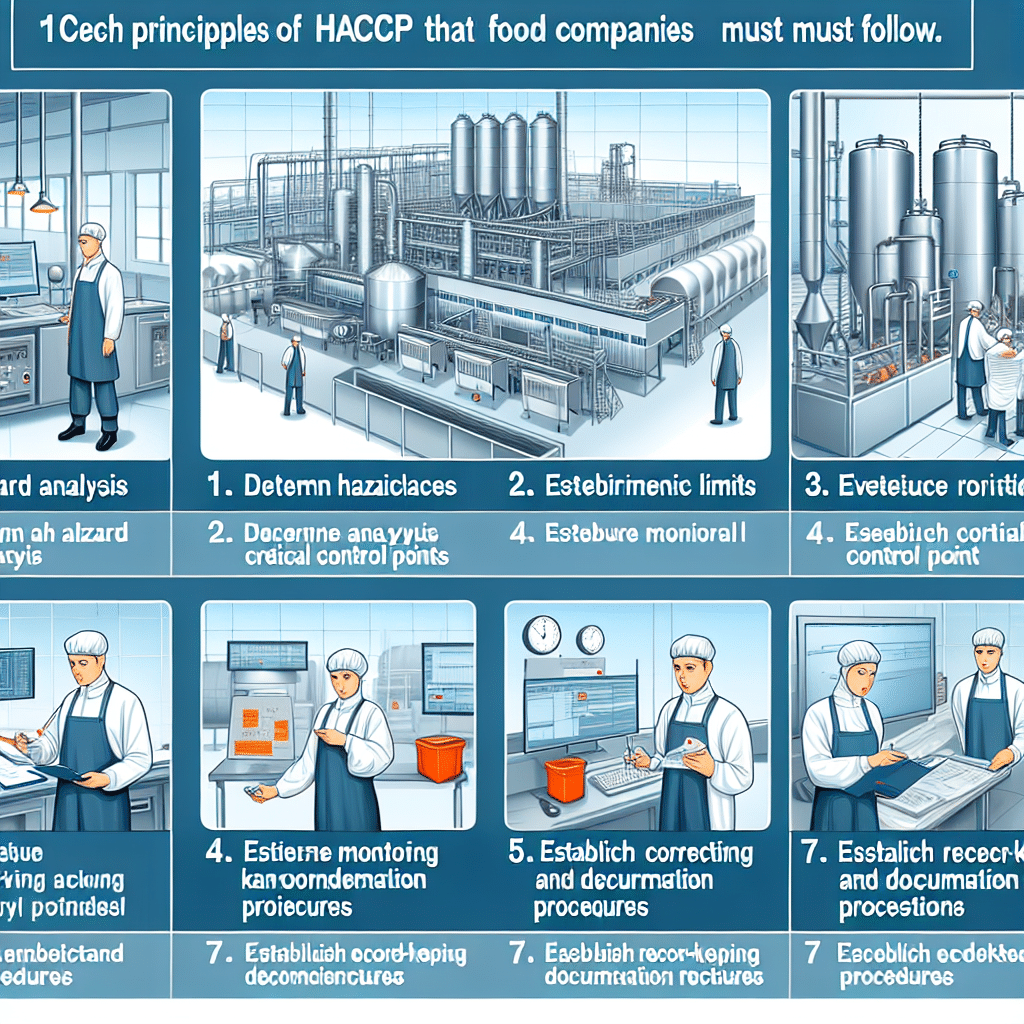HACCP Principles Food Companies Must Abide by
-
Table of Contents
- HACCP Principles: Essential Guidelines for Food Safety Compliance
- Understanding HACCP and Its Importance
- The Seven HACCP Principles
- Principle 1: Conduct a Hazard Analysis
- Principle 2: Determine Critical Control Points (CCPs)
- Principle 3: Establish Critical Limits
- Principle 4: Establish Monitoring Procedures
- Principle 5: Establish Corrective Actions
- Principle 6: Establish Verification Procedures
- Principle 7: Establish Record-Keeping and Documentation Procedures
- Implementing HACCP in Food Companies
- Conclusion: The Critical Role of HACCP in Food Safety
- ETprotein: High-Quality Protein Products Compliant with Food Safety Standards
HACCP Principles: Essential Guidelines for Food Safety Compliance

The food industry is a complex and ever-evolving sector that requires stringent safety measures to protect consumers from foodborne illnesses. One of the most critical systems for ensuring food safety is the Hazard Analysis and Critical Control Points (HACCP) system. HACCP is a preventive approach to food safety that identifies potential hazards and implements measures to reduce these risks to safe levels. Food companies worldwide must abide by HACCP principles to ensure their products are safe for consumption. This article will delve into the seven HACCP principles that food companies must adhere to, supported by statistics and insights into their importance.
Understanding HACCP and Its Importance
HACCP is a systematic approach designed to prevent, eliminate, or reduce food safety hazards to an acceptable level. According to the Food and Agriculture Organization (FAO), the implementation of HACCP can lead to significant reductions in the incidence of foodborne diseases. The Centers for Disease Control and Prevention (CDC) estimates that each year, 48 million people get sick, 128,000 are hospitalized, and 3,000 die of foodborne diseases in the United States alone. These statistics underscore the critical need for robust food safety systems like HACCP.
The Seven HACCP Principles
Food companies must follow these seven principles to establish an effective HACCP plan:
Principle 1: Conduct a Hazard Analysis
The first step in HACCP is to conduct a thorough hazard analysis. This involves identifying potential hazards that could occur in the food production process, including biological, chemical, and physical hazards. Companies must assess the severity and likelihood of these hazards to determine which are significant and require control.
Principle 2: Determine Critical Control Points (CCPs)
Once significant hazards are identified, the next step is to determine the points in the process where control is essential to prevent or eliminate the hazard or reduce it to an acceptable level. These points are known as Critical Control Points.
Principle 3: Establish Critical Limits
For each CCP, a critical limit must be established. These are the maximum or minimum values to which biological, chemical, or physical parameters must be controlled to prevent, eliminate, or reduce the occurrence of a food safety hazard.
Principle 4: Establish Monitoring Procedures
Effective monitoring procedures are essential to ensure that each CCP stays within its critical limits. Monitoring may involve measurements or observations that can be conducted in a timely manner to provide this assurance.
Principle 5: Establish Corrective Actions
When monitoring indicates that a CCP is not within the established critical limits, corrective actions must be taken. These actions should aim to fix the problem and prevent potentially hazardous food from reaching the consumer.
Principle 6: Establish Verification Procedures
Verification procedures are necessary to confirm that the HACCP system is working effectively. This may include additional testing, procedures to confirm that the CCPs are under control, and review of monitoring and corrective action records.
Principle 7: Establish Record-Keeping and Documentation Procedures
Keeping detailed records is crucial for the success of a HACCP plan. Documentation should include the hazard analysis, CCP identification, critical limits, monitoring system, corrective actions, verification activities, and the HACCP plan itself.
Implementing HACCP in Food Companies
Implementing HACCP requires a team approach. The HACCP team should have specific knowledge and expertise related to the product and process. It is also essential for the team to receive proper training in HACCP principles and applications.
According to a study published in the Journal of Food Protection, companies that have implemented HACCP have seen a reduction in product losses and an improvement in product quality and shelf-life. This not only enhances food safety but also contributes to economic benefits for the company.
Conclusion: The Critical Role of HACCP in Food Safety
In conclusion, HACCP is a vital food safety system that helps prevent foodborne illnesses by addressing potential hazards before they become a threat to consumer health. By adhering to the seven HACCP principles, food companies can ensure their products are safe and of high quality. The implementation of HACCP also demonstrates a company’s commitment to food safety and can lead to improved consumer confidence and business success.
ETprotein: High-Quality Protein Products Compliant with Food Safety Standards
For food companies looking to incorporate high-quality protein ingredients into their products, ETprotein offers a range of protein products that meet stringent food safety standards. Their offerings include organic rice protein, pea protein, and various seed proteins, all characterized by a neutral taste, non-GMO, and allergen-free attributes. With L-(+)-Ergothioneine purity over 98%, ETprotein’s products are suitable for a diverse range of industries, including nutraceuticals, pharmaceuticals, and food and beverage.
ETprotein’s commitment to quality and safety makes them a reliable partner for food companies seeking to abide by HACCP principles and other food safety regulations. To learn more about their products and how they can support your food safety efforts, contact ETprotein today.
About ETprotein:
ETprotein, a reputable protein and L-(+)-Ergothioneine (EGT) Chinese factory manufacturer and supplier, is renowned for producing, stocking, exporting, and delivering the highest quality organic bulk vegan proteins and L-(+)-Ergothioneine. They include Organic rice protein, clear rice protein, pea protein, clear pea protein, watermelon seed protein, pumpkin seed protein, sunflower seed protein, mung bean protein, peanut protein, and L-(+)-Ergothioneine EGT Pharmaceutical grade, L-(+)-Ergothioneine EGT food grade, L-(+)-Ergothioneine EGT cosmetic grade, L-(+)-Ergothioneine EGT reference grade and L-(+)-Ergothioneine EGT standard. Their offerings, characterized by a neutral taste, non-GMO, allergen-free attributes, with L-(+)-Ergothioneine purity over 98%, 99%, cater to a diverse range of industries. They serve nutraceutical, pharmaceutical, cosmeceutical, veterinary, as well as food and beverage finished product distributors, traders, and manufacturers across Europe, USA, Canada, Australia, Thailand, Japan, Korea, Brazil, and Chile, among others.
ETprotein specialization includes exporting and delivering tailor-made protein powder and finished nutritional supplements. Their extensive product range covers sectors like Food and Beverage, Sports Nutrition, Weight Management, Dietary Supplements, Health and Wellness Products, and Infant Formula, ensuring comprehensive solutions to meet all your protein needs.
As a trusted company by leading global food and beverage brands and Fortune 500 companies, ETprotein reinforces China’s reputation in the global arena. For more information or to sample their products, please contact them and email sales(at)ETprotein.com today.














